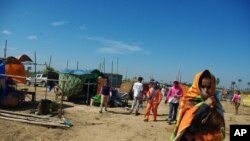An independent analyst says the Cambodian government faces the possibility of more protests if forced evictions continue across the country.
January was a particularly violent month for evictions, with residents of the Phnom Penh neighborhood of Borei Keila in violent clashes with police and the shooting of four villagers by rubber plantation guards at a protest in Kratie province.
“Among the land victims there are young boys and girls,” the analyst, Lao Monghay, said Tuesday. “When they grow up, we don’t know what they’ll do.”
The Khmer Rouge arose in part due to unrest in the countryside, he said.
The two guards involved in the Kratie shooting are now in custody, but they were arrested only after a prompting by Prime Minister Hun Sen. They both worked for the TTY Company, which is owned by a powerful business mogul.
Ou Virak, head of the Cambodian Center for Human Rights, said Tuesday the arrests were actually a failure of the judicial system, because authorities did not act without Hun Sen’s order.
“I urge the Cambodian government to review all economic land concessions that have human rights abuses,” he said. “If we find companies without licenses, we should remove them, because these companies are illegal and we are finding property purchases that are thefts.”
Government spokesman Phay Siphan declined to comment Tuesday.
Cheam Yiep, a ruling party lawmaker, said the government is working on reform. He said the chance of a revolt was very unlikely.
“In the Boeung Kak or Boreai Keila communities, the Cambodian government has taken care of everyone,” he said.
However, residents from both communities say they are not happy with relocation plans or buyouts. Some are still protesting.
Cambodia has around 200 government-provided land concessions, totally 2 million hectares.
Ouch Leng, a land issue monitor for the rights group Adhoc, said a large majority of these concessions ignore the land rights of people and most lead to forced evictions.




